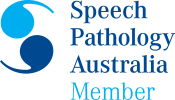Unlike pre-schooler stuttering, the evidence-base for successful treatment of school-aged children who stutter is limited. Currently, the most viable contenders for school-age stuttering treatments include:
Speech restructuring
These programs work on manipulation speech to help control stuttering like the Camperdown Program, which slows down speech rate to assist with fluency control. Speech restructuring can be successful for older children in their early teens however children below the age of 10 years often do not like using the speech pattern, and relapse is common.
Verbal response contingent treatments
For school-aged children that are less mature and not as old, the Lidcombe Program, which uses behavioural reinforcement for stutter free speech and stuttering, has some evidence to support its use (e.g. Koushik et al., 2009). These types of treatment do not work nearly as well for school-aged children as they do with pre-schoolers.
Video-self modelling
Video-self modelling works by allowing children to watch themselves as they produce a desired behaviour (stutter-free speech) to help facilitate said behaviour. Studies have been done with children as young as 8 years old, with low-level evidence to support its use (e.g. Bray & Kehle, 1998). The treatment is safe and easy to facilitate with video-recording technology so readily available however it is not successful with all individuals so it needs to be trialled on a case by case basis.
Syllable-timed speech treatments
Syllable-timed speech techniques (STS) like the Westmead Program which has also been termed ‘robot talk’ have been used (in different forms) for hundreds of years. They involve speaking with very little difference in stress across syllables. The Westmead Program like many predecessors of its type works by producing equal stress on all syllables in a rhythmic beat. Recent studies conducted this year have shown promising evidence to support this form of treatment and currently, this type of treatment looks to be the most promising contender for this age group.
It should be noted however that each individual is different and in order to determine the best course of treatment for your child it is essential that he or she be properly assessed by a qualified speech pathologist to determine whether the child fits the criteria for the selected treatment.
Contact us
This article was written by our Speech Pathologist Ashleigh Fattah who is a Speech Pathology Australia member. If you have difficulties with speech, make an appointment. We‘ll provide you with effective therapy targeted to your concerns. Contact us today.
The post What treatment is available for school-aged kids who stutter? appeared first on ENT Wellbeing Sydney.










